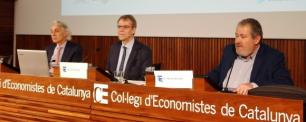The conservation of biodiversity, key to the future of the Catalan economy
During the second day organized by CREAF, the College of Economists and the Department of Territory on the IPBES report it became clear that the estimated cost of protecting biodiversity in Catalonia is 129 million euros per year. year. In Spain, 0.19% of GDP should be invested in the Natura 2000 network. A network that also generates 187,093 direct jobs and 401,906 indirect ones.

"So far we have shown that we can grow and generate wealth, but also that we haven't been able to distribute this wealth well or grow in a sustainable way" warned Oriol Amat, vice dean of the College of Economists of Catalonia, at the conference "Prosperity without nature? ” which was organized yesterday at the headquarters of the College in Barcelona. Ferran Miralles, Director General of Environmental Policies and the Natural Environment of the Catalan government, added that “our country is not escaping the accelerated loss of biodiversity and the emergency situation that our planet is experiencing in this area. We need to start talking about concepts that relate nature and the economy, such as natural capital."
The Economics and Sustainability Commission of the College of Economists of Catalonia, the Department of Territory and Sustainability, the Advisory Council for Sustainable Development (CADS), the CREAF ecology research center and the Center for Forest Science and Technology de Catalunya (CTFC) organized this day yesterday with the aim of analyzing the impact of biodiversity loss on the economy.
The day of debate, which also had the participation of the Biodiversity Research Institute (IRBio) and the Institute of Environmental Science and Technology (ICTA – UAB), is the second organized as a result of the dissemination of the report of the Intergovernmental Scientific-Political Platform on Biodiversity and Ecosystem Services (IPBES) that warns of the devastating effects on biodiversity of current production and consumption systems, with more than one million animal and plant species at risk of extinction around the world. The study of this independent body, created in 2012 by several UN agencies and made up of 130 governments, is the most relevant to date on the state of nature of the planet.
The Vice Dean of the College of Economists of Catalonia (CEC), Oriol Amat, the President of the Advisory Council for Sustainable Development of the Generalitat de Catalunya, Ramon Roca, and the Director General of Environmental Policies and Natural Environment of the Department of Territory and Sustainability of the Generalitat de Catalunya, Ferran Miralles, inaugurated the day moderated by Lluís Brotons, researcher of the CREAF and the CTFC.
Oriol Amat emphasized that "until recently, studies in economics did not delve into variables that are now considered, such as the dimension of sustainability". The vice-dean of the College of Economists of Catalonia and professor at Pompeu Fabra University added that “sustainability affects all dimensions of the economy and business” and as an example stressed that currently many companies they already make a triple account of results considering the financial part but also the one of the social and environmental results”.
In his speech, Ramon Roca considered the meeting very important because "we need to find ways to grow respecting the biodiversity we have." Roca expressed the "commitment of the CADS to continue working against the loss of biodiversity" and put the institution at the service of civil society and citizens to advance in this goal, as a government body in charge of implementing the objectives of the Agenda 2030 of the United Nations.
On the other hand, Ferran Miralles emphasized the importance of it being published for the first time a global report on the state of nature and put figures on the state of conservation of habitats and species in Catalonia (in Catalan and Spanish). Focusing on the economic dimension, he made it clear that we need to start talking about concepts such as “natural capital”; of the ecosystem services that nature provides to society and that are essential to our well-being and our economy; the economic costs of not conserving nature and the need to take them into account when assessing the cost and benefit of any initiative; and the need to propose a conservation policy not focused on the protection of spaces but on business projects based on generating new or more nature. Finally, he explained what actions the Government is taking to improve the financing of conservation policies, including the launch, this year, of the Natural Heritage Fund.
Victoria Reyes “according to the report, of nature's 18 contributions to society, only 3 are evolving positively: the production of food, energy and materials.”

The biodiversity and development consultant Santiago Fernández García-Velilla focused on the economic impact of biodiversity. First of all, he recalled that "the protection of biodiversity in Spain is largely conveyed through the Natura 2000 network, a European ecological network of biodiversity conservation areas". Fernández García-Velilla said that "in Spain, Natura 2000 does not have the necessary budget" and stated that "this should be 1,850 million euros a year, which would account for 0.19% of the GDP ”. The biodiversity and development consultant said that "investing this amount would generate 8,277 million euros a year, obtaining a positive cost-benefit balance of 6,427 million euros." Thus, "every euro invested in the Natura 2000 Network produces a return of € 4.5" and added that "if we consider the economic value of the carbon stored in the network, each euro invested would provide a return of at least € 22”. Santiago Fernández García-Velilla emphasized that the Natura 2000 network in Spain generates 187,093 direct jobs and 401,906 indirect jobs. Fernández García-Velilla also stated that "in Catalonia the estimated cost of protecting nature is 129 million euros a year".
Professor Ikerbasque then at the Basque Center for Climate Change BC3 Unai Pascual addressed the key aspects to encourage the debate on the relationship between biodiversity and the economy in Catalonia. Pascual stated that “we are still too stuck in the paradigm of progress” and added that “the transition to a green economy is more necessary than ever and should focus on a post-capitalist economic model that should be 'approach from a structural point of view'. Unai Pascual defended "the need for collective action that goes beyond individual incentives" and called for "ending perverse subsidies that encourage, for example, intensive agriculture." He also emphasized that "social equity is key to promoting collective action towards sustainability" and called for "nature to be valued beyond its short-term use". Pascual concluded that "new values that go beyond what is currently prevailing in the economy, such as productivity, must be encouraged."

The event was closed by the director of the Advisory Council for Sustainable Development of Catalonia, Arnau Queralt, who said that "the defense of biodiversity will require more days" and that "its conservation requires good governance."







